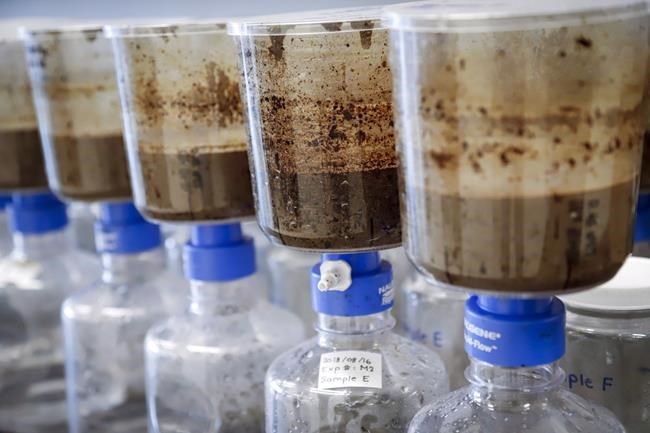OTTAWA — The head of Imperial Oil heard Thursday how a nine-month delay before informing downstream communities about a seeping tailings pond on a company oilsands mine created weeks of fear and rumours.
"This was not uncertainty, this was fear," Conservative member of Parliament Laila Goodridge told Imperial CEO Brad Corson, who was testifying before the House of Commons environment and sustainability committee.
The hearing was struck after two releases of toxic oilsands tailings water from the Kearl mine north of Fort McMurray, Alta. The committee was questioning Corson on why it took so long for First Nations and governments to find out what was happening with both the tailings pond seepage and overflow from a mine containment pond.
Goodridge, who represents Fort McMurray, said she visited one of the First Nations communities during that nine-month gap.
"I had elders telling me, 'We don't know what's going on, but don't drink the water,'" she said. "There was just a vacuum of information.
"People were afraid."
Corson repeatedly apologized for keeping people in the dark.
"I am deeply apologetic," he said.
"Imperial strives to build strong and lasting relationships with Indigenous communities based on mutual respect, trust and shared prosperity. We have broken this trust."
Seepage, originally described as discoloured water, was discovered in May. Corson acknowledged Imperial knew by August it was tailings, which have since been found to have left levels of toxic chemicals exceeding environmental limits in immediately adjacent waters.
But no notification was provided until February to leaders of six area First Nations.
"We did not speak directly with the leaders and we did not provide regular updates," he said. "We didn't want to go back to the communities until we fully understood the situation and had a plan."
Corson faced repeated questions about what Imperial was doing to clean up the mess.
He repeated findings that suggest no effects to area wildlife or to downstream drinking water.
He blamed the overflow on equipment and process failures, and the seepage on a layer of groundwater that was shallower than anticipated.
He said the company has 200 people working on remediation. It has dug trenches to intercept the ongoing seepage and installed more than 300 wells to pump it out and monitor its composition. It won't happen again, he said.
"I do believe (the pond) is a safe structure," he said.
Michael McLeod, an MP from the Northwest Territories riding of Deh Cho downstream from Kearl, was skeptical.
"As long as (the tailings ponds) exist, we're under the threat of leakage," he said.
"I've had the reassurances all my life that this isn't going to happen. Yet here we are."
Corson said he supported plans from federal Environment Minister Steven Guilbeault to create a working group with different levels of government, First Nations and industry to improve communication around what goes on in the oilsands. The group would also address concerns about seepage from all oilsands tailings ponds.
"The concept of bringing stakeholders together ... to work together to improve the communication process and to improve the management of tailing for this industry is positive," he said.
On Monday, the committee heard from First Nations leaders, who expressed fear and anger about how their communities were left ignorant about what was going on while their people continued to use lands next to the releases. They said the Alberta Energy Regulator has lost its credibility and called for it to be disbanded.
Next Monday, the committee expects to hear from Laurie Pushor, head of the Alberta regulator.
The committee hearings are one of three investigations going on into the Kearl releases. Alberta's Information Commissioner has begun a probe into whether the regulator had a duty to inform the public as soon as it heard about the problem, and the regulator's board is commissioning its own third-party review.
The environmental group Greenpeace is also calling for Imperial to be charged over releases of the toxic wastewater.
This report by The Canadian Press was first published April 20, 2023.
— By Bob Weber in Edmonton
The Canadian Press



